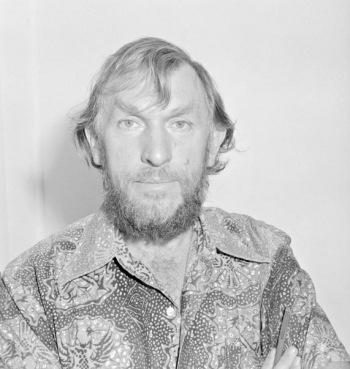It is with great sadness that I share the news, that many of you may already be aware of, that Associate Professor Hugh Laracy, long-time lecturer in Pacific History, and long-time friend of the Pacific and its peoples, has passed away.
Hugh taught thousands of students Pacific history, and was famous for his humour, his energy, his open door, his courageous lending of books and willingness to support any and every student. He always had a kind word, a seat and thoughts for students, and went the extra mile for them, especially Pacific students.
As one of Hugh’s students I know this first hand, having been given, along with my friends, a typically generous amount of Hugh's support. Indeed, Hugh was enormously generous, a big-hearted yet a humble and caring man, as well as a remarkable scholar, and very popular teacher. He had a palate for the finer points of language and the intricacies of grammar, all wrapped up with a mischievous humour that often sparked to life conversation and thinking.
After completing his PhD at the Australian National University, where he was in the first generation of academically-trained Pacific historians, Hugh joined the History Department at the University of Auckland, where he was the first to teach Pacific history. From Auckland he would energetically promote the understanding of the Pacific until his retirement in 2012.
Hugh was the author of a number of books beginning with Marists and Missionaries in 1976, his pivotal editing of Tuvalu’s first national history in 1983, the Solomon Islands history he edited—Ples Blong Iumi, in 1989, and most recently with Watriama and Co: Further Pacific Islands Portraits in 2013. Hugh's work in the Solomons was rewarded with that nation’s highest honour being bestowed on him, the Solomon Islands Medal.
Hugh was also a strong supporter of Pacific Studies, and the building now holds a lending library—on an honesty system—composed of some books donated from Hugh’s magnificent collection. Hugh was a man of letters, who found joy in research, learning and teaching, and who treasured the opportunities of the academy—in many ways all the more because he had come from proud working class origins, having begun work at the freezing works in Wellington.
Hugh was a staunch family man, a devoted husband and father of four, grandfather to six, a strong Catholic and a man of real character and commitment. No-one who knew Hugh does not have a story about, or from him. His old corner office, stacked to the gills with books and papers, always had an open door and normally an undergraduate parked in one of the many chairs, chasing an extension, or a reference or just in need of a conversation, which Hugh always had in spades.
With some sadness we all watched the buildings, the old History Department, come down a few weeks ago. Hugh was one of those that gave that building life, and made it a place to be missed; now he has now gone too. He was missed, he will be missed. Our hearts go out to Eugenie, and Hugh’s whanau.
Hugh was a wantok, but his time in the seminary honed his Latin, and he loved to quote in it. O quam cito transit gloria mundi.
Alofa atu, Hugh.
Associate Professor Damon Salesa








